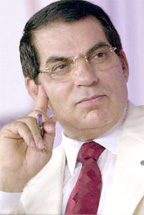TUNIS, (Reuters) – Tunisia’s new leader promised order would be restored while he attempts to form a coalition to take the country to elections after a wave of popular protests swept the president from power.
The Tunisian army was called onto the streets yesterday, witnesses said, as residents in several parts of the Tunisian capital said groups were marauding through the town setting fire to buildings and attacking people and property.
In a dramatic climax to weeks of violent protests against his rule, Zine al-Abidine Ben Ali, Tunisia’s president for more than 23 years, fled to Saudi Arabia yesterday and Prime Minister Mohamed Ghannouchi took over as caretaker president.

But it remains to be seen whether the protesters will accept Ghannouchi’s interim leadership, or take to the streets again.
“Tomorrow we will be back on the streets, in Martyrs Square, to continue this civil disobedience until … the regime is gone. The street has spoken,” said Fadhel Bel Taher, whose brother was one of dozens of people killed in protests.
Occasional gunshots could be heard in the centre of Tunis as well as the sound of tear gas grenades being fired, while helicopters patrolled overhead and acrid smoke hung in the air. In working class suburbs, residents lined the streets, holding metal bars and knives to ward off looters.
Ghannouchi went on live television, via telephone, to promise everything was being done to restore order.
“I salute the fact that groups of young people have got together to defend their neighbourhoods but we can assure them we will reinforce their security,” Ghannouchi said.
“We are at the service of the Tunisian people. Our country does not deserve everything that is happening. We must regain the trust of citizens in the government.”
The prime minister told Tunisians he would steer the state until early elections. But it was not clear whether protesters would accept the technocrat Ghannouchi, prime minister since 1999, due to his close association with Ben Ali’s rule.
“All I fear is that the Tunisian street, as long as it sees one person from this regime remain, will continue to complain. We need to create a government in which all parties are represented, to salvage the situation,” said Paris-based analyst Ahmed al-Bawlaqi.
“Crucial moment”
Ghannouchi said he would meet representatives of political parties on Saturday to attempt to form a coalition government.
“Tomorrow will be a decisive day,” Ghannouchi told a private Tunisian television station in a telephone interview. “I will meet representatives of political parties to form a government which I hope will meet expectations.”
One of those invited to meet Ghannouchi for coalition talks was Najib Chebbi, an eloquent lawyer who has long been seen by Western diplomats as the most credible figure in the opposition.
“This is a crucial moment. There is a change of regime under way. Now it’s the succession,” Chebbi told France’s I-Tele TV. “It must lead to profound reforms, to reform the law and let the people choose.”
The violence and rapid turn of events sent shockwaves across the Arab world, where similar authoritarian rulers are deeply entrenched, but face mounting pressures from growing young populations, economic hardship and the appeal of militant Islam.
Western powers have long turned a blind eye to rulers in the region who provide a bulwark against Islamist radicals. The United States led international calls for calm and for the people of Tunisia to be given a free choice of leaders.
“I condemn and deplore the use of violence against citizens peacefully voicing their opinion in Tunisia, and I applaud the courage and dignity of the Tunisian people,” said U.S. President Barack Obama.





